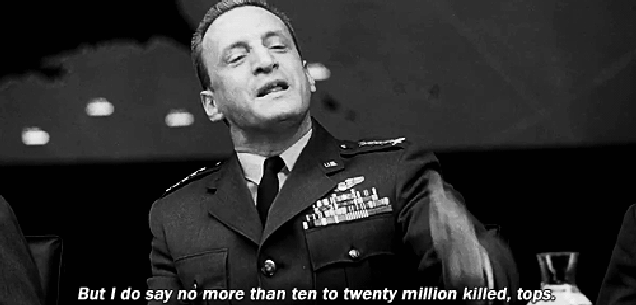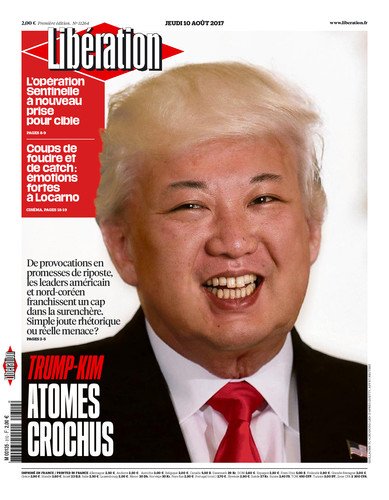-
• #3377
Hyperpower sounds really supervillain comic style
-
• #3378
I stand corrected. Does that make it worse Fox only think military people count ?
Im slightly worried about nuclear war. 2 fuck wits trying to out stupid each other is not a good prospect.Hyperpower what a crock of shite
-
• #3379
Enjoying some of the twitter wit https://twitter.com/simonblackwell/status/895052996094152704
-
• #3380
.

-
• #3381
Yesterday's Fire and Fury speech may have had something to do with trying to cover up Paul Manafort's meeting with the Senate Intelligence Committee.
-
• #3382
So, he was ad-libbing
https://mobile.nytimes.com/2017/08/09/us/politics/trump-north-korea.html
-
• #3383
Fuck
-
• #3384
.
1 Attachment
-
• #3385
Indeed. But also, rockets are just plain difficult to get right. It's daft to assume no progress will be made but right now there just isn't much of a threat.
I'm not sure what you're basing that on. Rockets are indeed difficult, and the North Koreans have become good at them through sustained development effort spanning decades.
They are a poor country, but they spend approx. 25% of their GDP on defence, and much of that is on their nuclear weapons programs. To put it in context, they are spending a similar (adjusted) amount to what France was spending on nuclear weapons in the 1960's, a time when France fielded multiple successful nuclear weapons systems, (including missiles).
I really would urge you to examine any beliefs that, because something is difficult, the North Koreans are incapable of doing it. This blog post is a good read, if you haven't seen it already. The author is also worth following on Twitter on matters of nuclear proliferation, and general atomic trivia.
-
• #3386
Makes you wonder if Kim Jon-doodah's threat is in response to that vanity fair article about the new administration having no clue about the defence structure?
-
• #3387
If you have tears to shed...
https://twitter.com/realDonaldTrump/status/895398465290723329 -
• #3388
All this talk of Nukes, here's a long sobering read of the aftermath of Hiroshima, shared by bbc yesterday:
-
• #3389
I have never experienced anything like what I felt the first time I went to Hiroshima center. You look around and see people going to and from work, children running through parks, traffic moving normally and know that everything was just like that seconds before it was obliterated. It's a visceral, nauseous feeling that brought me to tears.
It's easy to joke about nuclear destruction, but very difficult to comprehend the sheer horror it represents.
-
• #3390
I managed to watch 1m30s of that before I cringed so much it had to go off.
-
• #3391
Hard reading.
-
• #3392
How did you get hold of the new Guantanamo torture music?
-
• #3393
The FBI raid on Paul Manafort's house was a 'no knock' raid which meant they broke into his house to prevent him destroying evidence and knocked on his bedroom door to let him know they were there.
-
• #3394
That's amazing isn't it. Apparently Trump gets given a folder containing positive coverage a couple of times a day, and when that proves difficult (i.e. they've used up all the Fox snippets), they dig around for photos of him looking presidential.
-
• #3395

-
• #3396
^ Van Gaal there on the left
-
• #3397
An FT article on 'The Trump show'
It has become a global ritual: you wake up each morning and grab your phone to catch up on the latest episode of The Trump Show, the addictive reality TV series. Which character has been humiliated, investigated or sacked? This has been the most distracting political year of my lifetime, and potentially the most dangerous. It’s not only Trump’s fault. After all, we are the viewers.
People in reality TV admire Trump as an astute professional. In 2015, after US TV audiences began to fall, he jumped to politics and put on a new show. This is not a metaphor: he still thinks like a reality performer. Reality TV perches between fiction and non-fiction, which is the spot where Trump feels happiest. Reality shows have scripted plots or formats, but partially real characters. Trump, several of whose companies have been bankrupted, played a successful businessman on TV, and so viewers could imagine him playing one in the White House.
Season one of Trump’s political show was the presidential campaign. It used the standard industry format known as “reality competition” (kicking the other contestants off the island), only with bigger stakes (the presidency) and A-list celebrities (who rarely consent to appear on reality TV).
In season two, Trump is improvising a new format. It largely dispenses with boring political characters, especially now that Congress probably won’t pass any major bills. Instead, the cast consists of Trump’s relatives (who can’t be kicked out of Trumpworld) and his posse (who can). The relatives were born into the show so they understand Trump has to be the star, but some posse members fail to grasp what genre they’re appearing in. John Kelly, for instance, imagines he is Trump’s chief of staff, whereas in fact he’s The Trump Show’s new Marine-general character.
But they are all dispensable characters. The ideal star of a reality series is an uninhibited narcissist who gradually reveals the inner reaches of his personality. As the reality TV producer Troy DeVolld explained in 2013: “That’s when celebrity casting works for me — when you actually get to see who somebody is, beneath who you thought they were when they came into it.”
The Trump Show is broadcast non-stop on both social media and TV, so its pace is unprecedented. Judged as entertainment, it’s vastly superior to the Barack Obama series. Whereas all other TV shows are now niche, this one appeals to all demographics. When Trump defenestrated his latest communications chief, I heard a nine-year-old excitedly shout: “Scaramucci’s fired!”
Scripted reality TV gives viewers a role too. The main character’s actions simply kick off each episode. The plot is then driven by the reactions of other characters, and often by audience voting. Elite viewers and journalists get especially absorbed in The Trump Show, because they kid themselves that they are watching serious programming, and because they generally hadn’t watched reality TV before and are surprised to discover how enjoyable it is.
But they tend to misunderstand the conventions of the genre, and accuse Trump of lying when in fact he’s performing in a show. They also complain he doesn’t have a concentration span. Of course he doesn’t: in reality TV, if you spend a few minutes developing complexity, the audience switches off.
The broader problem is that we viewers — the smartphone generation raised in peacetime — have no concentration spans either. Trump is the fitting president for our era. No wonder that another merchant of distraction, Facebook’s Mark Zuckerberg, thinks he can be president next.
Some liberals worry that Trump is distracting us in order to implement some master plan, such as bringing fascism to America. He isn’t. Trump doesn’t care about policy, though some people in Trumpworld do. He’s a lowbrow entertainer, so he produces lowbrow entertainment.
However, he is trying to distract us from one storyline that he can’t control: his campaign’s ties with Russia. Often a firing coincides with news about Russia. He rages at leakers of such news, partly because they derail his show. But he cannot keep viewers hooked merely by firing press secretaries. And Congress won’t let him fire the Robert Mueller character, the villain who is leading the Russian investigation. Trump therefore needs to create a new A-plot: by firing a major character such as Steve Bannon (who is frantically pretending to be a minor character), or perhaps by bombing Pyongyang.
That’s one of the existential dangers from which The Trump Show distracts us. The other one is climate change. Almost nobody is watching this boring show without human characters, but meanwhile giant icebergs break off into the Antarctic, forest fires ravage Europe and a study in the journal Nature Climate Change estimates a 95 per cent chance that average global temperatures will rise more than 2C by 2100.
We saw a decade ago, even before smartphones, that distraction can lead to destruction: incomprehensible credit-default swaps caused the global financial crisis. Neil Postman’s classic 1985 study of television, Amusing Ourselves to Death, ends with the warning that “we are in a race between education and disaster”. I know which one my money’s on.
https://www.ft.com/content/a41f0638-7c89-11e7-ab01-a13271d1ee9c
-
• #3398

-
• #3399
The Peace Memorial museum is hard going. It was one long cry-fest for me, and afterwards I just felt cold and a bit sick.
It's nice/positive/uplifting that Hiroshima is now a young and vibrant city, full of students and outgoing young people, but then you realise the reason for that is because the majority of residents were wiped out and everything had to be rebuilt. They didn't just one day make a decision to renovate the city, they had to rebuild it.
I had intended on going out and sampling the nightlife in this new city, but I no longer had the appetite and went and curled up in a ball in the hotel.
Solid honeymoon activity.
-
• #3400
'peacetime'.
Strange use of the word peacetime. I'm fairly certain I read an article, before the Iraq War, that showed that there was scarcely a month let alone a year when either UK or US troops weren't on active service somewhere, from 1945 onwards,
and,
that was before you accounted for covert operations or 'local' activities like Ulster.
 PepOne
PepOne Rich_G
Rich_G starfish&coffee
starfish&coffee Doctor_Cake
Doctor_Cake boristrump
boristrump rodan
rodan itsbruce
itsbruce
 stedlocks
stedlocks WillMelling
WillMelling rhb
rhb mi7rennie
mi7rennie TooTallTim
TooTallTim dubtap
dubtap abr
abr NurseHolliday
NurseHolliday @dst2
@dst2
^ Well there is certainly something hyper about the Trump (mis)Administration,
but,
I wouldn't bet on it being power.